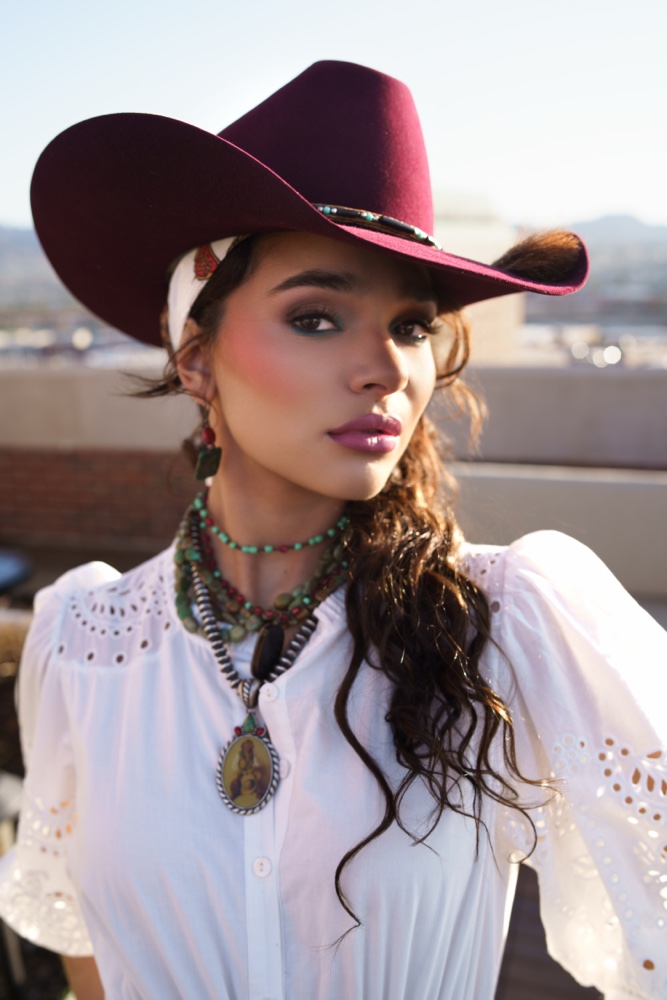Story
Erin Coulehan
Photography
Jordan Licon
Photo Assistants
Annabella Mireles; Katherine Kocian
Wardrobe
Lucchese and Shelley Mozelle
Makeup
Claudia Castillo
Hair
Luly James
Location
The Plaza Hotel Pioneer Park
The sun had barely stretched over the Franklin Mountains when Paulina Chávez and her mom, Patricia, landed at El Paso International Airport, returning to the city that quietly shaped their roots. As we greeted them curbside, Paulina was effortlessly low-key – Levi’s, curly hair, no makeup, but glowing with warmth and that star presence that never really switches off. Her mom beamed, gracious and grounded, the kind of woman who feels like home the second you meet her.
First stop: La Coa. Chilaquiles, chorizo burritos, and laughter over salsa that had just the right kick. Then came a morning ritual – lattes at 787 Coffee on Mesa, where the barista double-taked when he realized who just ordered the iced horchata latte.
“This is so cute,” Chávez said, snapping a photo of the Bad Bunny mural. We cruised through downtown to Union Station and made a detour at Rocketbuster Boots, where the Chávezes marveled at the intricate artistry and considered a pair of olive green-inlaid customs. It was a fast but full loop – just enough to stir old family memories and spark new curiosity about a city she’s proud to claim.
By the time we arrived at The Plaza Hotel Pioneer Park, the glam team was buzzing with excitement. Lucchese and our own Shelley Mozelle had provided an array of stunning boots and looks for the shoot – bold, timeless pieces that reflected Chávez’s unique fusion of classic Texas spirit and rising star elegance. As the sun dipped behind the skyline and the final camera flashed, we wrapped the day at Amar for dinner – Peruvian lomo saltado, ceviche, and cocktails clinking to good company and full-circle moments.
“This feels really special,” Chávez said, looking out at the city lights. And it was.
As the hours grew later and the lights of downtown El Paso flickered against the desert sky, her schedule pulled back into focus. There were only a few hours left before she’d be on a flight to head back to set filming Season Two of “Landman.” The break had been brief but meaningful: a chance to reconnect with her hometown, reflect on how far she’s come, and recharge before diving back into the high-stakes world of Taylor Sheridan’s oil drama.
“Landman” dives deep into the high-stakes world of the modern Texas oil industry, offering a gritty, character-driven narrative that mirrors the real-life boomtown chaos of West Texas. Known for his sharp portrayals of the American frontier in shows like “Yellowstone” and “1883,” Sheridan turns his lens toward the fossil fuel empire, focusing on the personal and political consequences of fortune, ambition, and exploitation. Loosely based on the podcast Boomtown, the series captures the tensions between roughnecks, executives, and the communities caught in the fray, revealing how oil can both build and break lives. With its sweeping landscapes and morally complex characters, “Landman” is a raw, timely exploration of American identity, wealth, and survival in the heart of a modern gold rush.
Chávez was born in El Paso, Texas, but her story starts in a small, bustling cafeteria at Sky Harbor Elementary in San Antonio. It was there, while wandering the halls after school, that the future actress stumbled upon a drama rehearsal – and her life shifted.
“I was in first grade, and I didn’t even know what I was watching,” she says now, laughing. “But I was absolutely enamored.”
That moment sparked a journey that would take her from local theater productions to national commercials, student films, Netflix originals, and now major roles in blockbuster TV and feature films. It also ignited something more: a calling – not only to perform – but also to create meaningful change in an industry that’s only just beginning to make room for voices like hers.
Today, Chávez is not just a star on the rise. She’s an actor, a scholarship founder, a cultural advocate, and a role model for the next generation of young Latinas looking to break into Hollywood and beyond.
Chávez’s story begins in El Paso with the love story that preceded her birth. Her parents met in high school, her mom attending Bel Air and her dad Ysleta, two schools rooted deep in the city’s east side.
“They’ve been together since they were kids,” she says. “They met when they were really young and are still together. Epic love story, right? I’ve got a lot to live up to.”
After the family moved to the small town of Lytle, just south of San Antonio, Chávez’s artistic path started to unfold. But her journey into the industry wasn’t a solo act; it was built on her family’s tireless support. Her mother, a full-time public school teacher, spent weekends driving five-and-a-half hours each way to take her to acting classes near Dallas.
“She gave everything for me to pursue this dream,” Chávez says. “Most of her paycheck went toward gas and classes.”
After booking her first professional gigs that included voiceovers, regional commercials, indie shorts, Chávez started gaining traction. At 17, she landed the lead in “The Expanding Universe of Ashley Garcia,” a Netflix sitcom where she played the world’s only 15-year-old Latina robotics engineer and rocket scientist.
The show was more than a breakout – it was historic.
“That was the first time I saw a version of myself portrayed as brilliant, complex, and proud of who she was,” she says. “It wasn’t about checking a diversity box. It was a smart, joyful representation. It meant everything to me.”
For Chávez, roles like Ashley Garcia don’t just represent acting opportunities; they’re part of a larger mission.
“Growing up, I didn’t see girls who looked like me on screen unless we were the maid, the best friend, or the comic relief,” she says. “That does something to you. You start to believe there’s a limit to who you can be.”
That’s why every role she takes on now is intentional.
Her current work in Sheridan’s “Landman,” where she plays Ariana – a fierce, grounded, working-class young mother and widow– is a tribute to the women who raised her.
“I auditioned with just the opening scene,” she recalls. “A month later, I was in L.A. when I got the callback to test. I was like, ‘The Taylor Sheridan show? The one where I’m a mom? Are you sure?’” She laughs at the memory, still in awe of how surreal it felt. There were nine girls testing for the role – “a lot,” she notes – and each of them brought something completely different to the table. “We all looked totally different. At the time, I had red hair – and bangs!” she adds with a grin.
“That character is a love letter to my mom, my tias, my grandma,” she says. “Especially when I’m yelling on screen. I hear them in those lines.”
The authenticity of that performance caught fire.
In “Landman,” Chávez isn’t just acting – she’s shifting the frame.
For years, Latina characters have been confined to stereotypes, rarely given the space to be fully human. But Ariana is a newly widowed mom with grit and vulnerability, ambition and love. Her presence onscreen doesn’t just add representation, it deepens it. Through this role, Chávez is helping rewrite what Latina visibility in Hollywood looks like: bold, unfiltered, and rooted in truth.
After a scene involving on-screen breastfeeding (which Chávez had to learn from her sister in real-time via FaceTime), she received praise not just for her performance, but for her vulnerability and power in telling women’s stories without gloss.
“It’s about truth,” she says. “And for a long time, Latina characters weren’t written with truth. Now I get to change that.”
The final piece of the puzzle came with a chemistry read alongside co-star Jacob Lofland.
“We didn’t really know each other, so it was a little awkward,” she says. “But I think that made it interesting. That awkwardness helped reflect the characters’ dynamic.”
As the character Ariana – tough, nurturing, and layered – Chávez found herself channeling the women in her life. She wasn’t stepping solely into a fictional role; she was breathing life into a character who reflected the strength, complexity, and soul of real Latina women.
The fight for representation in entertainment is still uphill, and Chávez doesn’t shy away from the hard conversations.
“There was a time when there was only room for one Latina in my age group,” she explains. “And it created this toxic competitiveness. That’s changed. There are more roles now, more space, but we’re still building that space ourselves.”
Her mentors, including Eva Longoria (who directed episodes of “Ashley Garcia” and now stars alongside her in “Alexander and the Terrible, Horrible, No Good, Very Bad Day”) have modeled what it looks like to lift others up.
“Eva surprised us on set when I was 17, and I bawled,” Chávez says. “Now, years later, she’s like a big sister. She’s taught me so much about navigating this business with both fire and grace.”
In “Alexander,” Chávez plays Mia Garcia, a sharp-witted, independent 16-year-old navigating a family road trip gone hilariously wrong. But beneath the chaos lies a deeper emotional resonance that Chávez connects with.
“Mia is the first to see the beauty in the world around her, even when everything is falling apart,” she says. “That’s something I try to live by.”
In 2020, Chávez took her commitment to education and representation a step further by launching the Be Your Own Kind of Genius scholarship, aimed at helping young people – especially from underrepresented communities – pursue STEAM fields (science, tech, engineering, arts, and math).
“Education is expensive. Film school is expensive,” she says. “Even if it’s just gas money to get to class, it helps.”
In partnership with The Salvation Army San Antonio, she now helps select local students each year and is working to grow the program across Texas and beyond. “It’s about access,” she explains. “Everyone deserves a shot. And, we’re just getting started.”
Chávez’s rise might seem like a perfectly timed trajectory, but behind every red carpet and glowing review were quiet, soul-shaping moments of doubt and solitude. Like many child actors, Paulina had to grow up fast, juggling school, self-tapes, and social sacrifices most teens couldn’t imagine.
“This industry is not easy,” she says. “You do a hundred auditions before you book one. And in the in-between, you question everything.”
She remembers long stretches where she felt isolated, overwhelmed, and unsure whether the sacrifices were worth it. But then opportunities would take shape.
“I’d get a callback,” she says, “a little bit of light. And I’d keep going.”
Then came one of the most defining (and devastating) turning points of her life. Just a week before Chávez was set to leave for Los Angeles, her grandmother passed away.
“She was supposed to come with us,” Chávez says softly. “She lived with us my whole life. Watching her take her last breath was… indescribable.”
The grief was crushing.
Her grandmother had been her comfort, her sounding board, her steady presence growing up while pursuing her dreams in the entertainment industry.
“We spent so much time together. Every night, we’d watch telanovelas. I just wish she could see where I am now.”
It was a strange season marked by professional success and personal sorrow.
“I was doing amazing things, living my dream, but feeling so unhappy,” Chávez admits. “No one teaches you how to grieve. How can you be so happy and so sad at the same time?”
That paradox lingered as the world turned upside down with COVID-19. The lockdowns brought everything to a standstill – including production – but also gave her time to process, reflect, and heal. It made her see her journey in a new light, not just as a pursuit of stardom, but as a legacy of love, resilience, and the women who came before her.
For many families, success is never just about the individual: it’s about honoring the generations that came before, and fulfilling a promise made silently through sacrifice, hard work, and unwavering belief.
Chávez grew up in a household shaped by this ethos.
“I did good, but I could do better,” she’d think to herself.
It wasn’t about pressure so much as pride: a deep-seated desire to make her family proud, to carry their dreams forward, and to exceed any limitations she faced. That mindset became her fuel, driving her through auditions, setbacks, and long hours on set, even when recognition felt far away.
Still, in the fast-moving world of entertainment, where wins are fleeting and rejection is routine, that internal bar of excellence can become a heavy weight to carry.
“This industry can be lonely,” she reflects. “People don’t always understand the sacrifices.” But with every year, Chávez has grown more rooted in who she is and what she stands for.
She doesn’t measure her worth by her résumé or her latest role. Instead, she’s focused on building a career that reflects her values: creativity, representation, intention, and joy. Her dreams stretch far beyond the screen: she envisions a future filled with storytelling on her own terms, directing projects that resonate deeply, and living in the places that inspire her – Spain, Mexico, maybe Scotland – with a partner who shares her heart.
It’s that mix of cultural pride and personal clarity that makes Chávez’s journey so powerful.
She’s not just chasing the spotlight; she’s reclaiming the narrative, proving that young Latina artists can lead, create, and thrive without compromising who they are.
“To my 10-year-old self, I’d say: ‘Trust your intuition. I have a good one. I’m learning to follow it,’” she says.
That may be her greatest triumph yet; not only achieving the dreams others had for her, but also discovering her own along the way.
In doing so, Chávez is not only making her parents proud, she’s giving the next generation of girls permission to dream louder, rise higher, and know, without a doubt, that they too are enough.
“I like who I am today,” she says with a soft, assured confidence. “And, that’s a good place to be.”
















